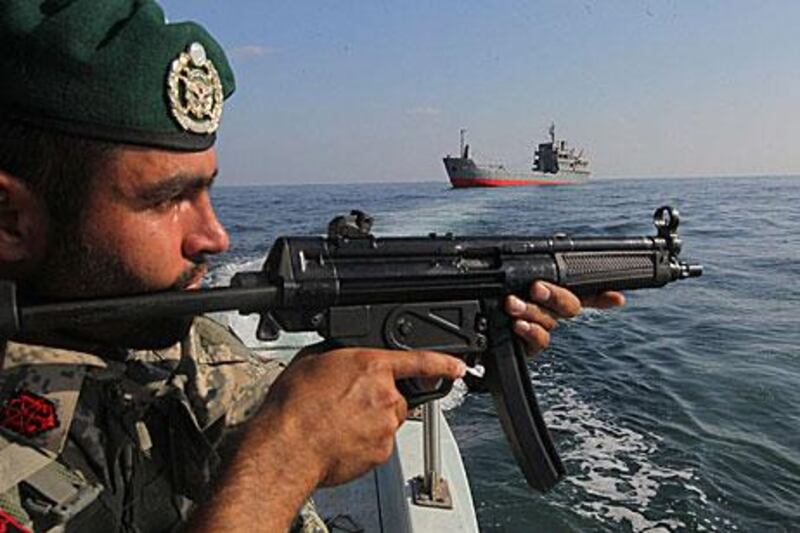TEHRAN // A showdown between Iran and the United States over Tehran's threats to close the Strait of Hormuz to oil tankers worsened with warships from each side giving weight to an increasingly bellicose exchange of words.
Iran's Revolutionary Guards rejected a warning that the US military would "not tolerate" such a closure, saying they would act decisively "to protect our vital interests".
"Any threat will be responded by threat ... We will not relinquish our strategic moves if Iran's vital interests are undermined by any means," said Brigadier General Hossein Salami, a guard commander.
The tough language came as Iran's navy said a US aircraft carrier entered a zone where its ships and aircraft were in the middle of 10 days of war-games designed to be a show of military might.
Iran's navy chief, Admiral Habibollah Sayari, said the US aircraft carrier was monitored by Iranian forces as it passed from the Strait of Hormuz to the Gulf of Oman, according to state television.
The network showed footage of an aircraft carrier being followed by an Iranian plane.
An Iranian navy spokesman, Commodore Mahmoud Mousavi, told the official IRNA news agency the aircraft carrier went "inside the manoeuvre zone" where Iranian ships were conducting their exercises.
He added that the Iranian navy was "prepared, in accordance with international law, to confront offenders who do not respect our security perimeters during the manoeuvres".
Lt Rebecca Rebarich, a spokeswoman for the US 5th Fleet, said the aircraft carrier USS John C Stennis and the guided-missile cruiser USS Mobile Bay headed out from the Gulf and through the Strait of Hormuz on Tuesday, after a visit to Dubai's Jebel Ali port.
She described the passage through the strait as "a pre-planned, routine transit" for the carrier, which is providing air support from the north Arabian Sea to troops in Afghanistan.
Lt Rebarich did not directly address Iranian claims of possessing the reported footage but said the 5th Fleet's "interaction with the regular Iranian navy continues to be within the standards of maritime practice, well known, routine and professional."
The Iranian first vice president, Mohammad Reza Rahimi, warned this week that "not a drop of oil will pass through the Strait of Hormuz" if the West followed through with planned additional sanctions against Iran over its nuclear programme.
A US defence department spokesman replied on Wednesday, saying "interference with the transit ... of vessels through the Strait of Hormuz will not be tolerated".
The United States maintains a navy presence in the Gulf in large part to ensure oil traffic there is unhindered.
Iran, which is already subject to several rounds of sanctions over its nuclear programme, has repeatedly said it could target the Strait of Hormuz if attacked or its economy is strangled.
Such a move could cause havoc on world oil markets, disrupting the fragile global economy.
Its navy manoeuvres included the laying of mines and the use of aerial drones, according to Iranian media. Missiles and torpedoes were to be test fired in coming days.
Analysts and oil market traders were watching the developing situation in and around the Strait of Hormuz carefully, fearing a spark could ignite open confrontation.
The United States had proposed a military hotline between Tehran and Washington to defuse any "miscalculations" that could occur as their navies brush against each other. But Iran in September rejected that offer.
* Agence France-Presse with additional reporting by Associated Press





